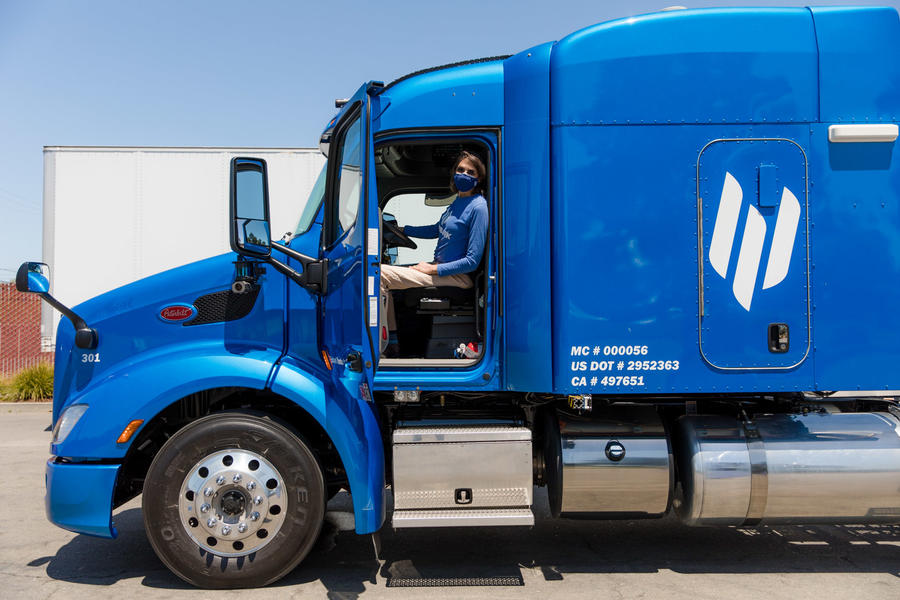
How Embark Trucks is Driving Innovation
Embark Trucks, based in California, is using automated vehicle technology to make the roads safer, operations more efficient and sustainable, and supply chains more resilient. Find out how.
Like stories of leading innovators that preceded them, U.S. Chamber Dream Big Awardee Embark Trucks began with two students in a garage. In 2015, Alex Rodrigues and Brandon Moak set out to build Canada’s first self-driving vehicle, an autonomous golf cart named “Marvin” that was used to take guests on tours of the campus at the University of Waterloo. When it became clear their technology was worth pursuing, the two dropped out of college and started a company. Today, Embark is the longest running self-driving truck company in the U.S. and, through a $5.2 billion merger with Norther Genesis Acquisition Company II, poised to go public later this year. In 2024, the company is set to launch its Embark Driver software and already has 14,200 reservations for the system.
Automated vehicle technology is a game-changer for the nearly $700 billion trucking industry, which provides Americans with their most vital needs, from food and vaccines to raw materials. Automation promises to improve services and provide solutions to societal challenges. Self-driving trucks can operate 24 hours a day, enabling faster deliveries and fresher products. Assisted by artificial intelligence, machine learning, and a wide set of data points, automation has been show to lead to fewer accidents, which in turn increase safety and reduce traffic congestion. Studies have also found that automated trucks could reduce fuel use by 10%, due to more efficiently-tuned driving behaviors by the autonomous system. The reduction in costs of these benefits is estimated to be $168 billion.
Although some critics often point to the potential negative impact of automation on drivers, automated vehicles would actually help with the national trucker driver shortage and complement the existing trucking workforce. For years, the U.S. has faced a chronic shortage of truck drivers, an issue exacerbated to crisis levels around the globe due to pandemic disruptions to supply chains and surging demands for delivery services. The result has been far-reaching. Fuel shortages, stalled manufacturing, and record prices for supplies are just some of the problems plaguing companies across industries. The deployment of self-driving trucks would help fulfill these critical needs and build resilience to global supply chains, especially as the shortfall of drivers is projected to more than double by 2028.
Even the potential of displacement of current drivers is largely misunderstood and may actually lead to more jobs. Lower costs and higher efficiency would stimulate demand and create more business in trucking. The effect of automation on the labor market will likely take place over the span of several decades. For the time being, drivers may still need to be in the cab of trucks as a safety measure.
These are some of the goals that Embark aims to deliver on. The company’s mission is “to build a world where consumers pay less for the things they need, drivers stay close to the homes they cherish, and roads are safer for the people we love.” Embark’s business focuses exclusively on the software and associated services that will power self-driving trucks. Through a Partner Development Program, carriers and shippers are collaborators instead of competitors on the road to commercializing self-driving trucks. Each of the 14,200 reservations for its software, licensed on a distinct per-mile basis, reflects the needs of the individual fleet operator, which enables easy incorporation and scaling.
Reaping the rewards promised by automated trucking depends on a close partnership between the industry and state and federal regulators. The right legislation would enable responsible innovation while earning the public’s trust. Embark was one of several automated driving systems developers who worked with the Department of Transportation to develop guidance on how existing Federal Motor Carrier Safety Regulations (FMCSRs) would interact with automated trucks. The resulting publication, “Preparing for the Future of Transportation: Automated Vehicles 3.0,” is a landmark document that highlights the success of DOT’s collaborative approach with industry.
The promise of automated trucking is great and imminent. Companies like Embark are using the technology to make the roads safer, operations more efficient and sustainable, and supply chains more resilient. AVs could generate an additional $3.4 trillion of economic activity and support the creation of millions of jobs. Realizing these wide-ranging benefits requires policymakers to work closely with the industry to establish a clear regulatory framework that enables innovation.
“We believe that a technology like self-driving vehicles can only succeed if there’s buy-in from private and public sector stakeholders,” says Mr. Rodrigues, “That’s why we’ve made it a key pillar of our business model to work closely with everyone in the transportation ecosystem to ensure the smooth and safe rollout of self-driving trucks.”
The Weekly Download
Subscribe to receive a weekly roundup of the Chamber Technology Engagement Center (C_TEC) and relevant U.S. Chamber advocacy and events.
The Weekly Download will keep you updated on emerging tech issues including privacy, telecommunications, artificial intelligence, transportation, and government digital transformation.
